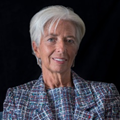Bretton Woods at 75 - Rethinking International Cooperation

IMF SEMINAR EVENT
DATE: April 10, 2019
DAY: Wednesday
11:30 AM - 12:30 PM
LOCATION: IMF HQ1 Atrium (HQ1-1-700)
Overview
In the aftermath of World War II, the IMF and the World Bank were created to establish a framework for economic cooperation and development that would lead to a more stable and prosperous global economy. Over the last 75 years, the world has indeed improved—incomes and living standards have risen. The benefits, however, remain unequally distributed within many countries, and prosperity is not assured for future generations in many parts of the globe. The seminar will bring together four of the best young academics in the world to discuss how they see the future of international cooperation—and how to further improve international cooperation to strengthen macroeconomic stability and prosperity.Join the conversation via #BW75
Bretton Woods at 75 - Rethinking International Cooperation
Summary
-
Emmanuel Farhi. While the US dollar remains the main global reserve currency, growing global demand for safe assets and historically low interest rates may lead to the reemergence of a “Triffin dilemma.” New currencies will likely compete for reserve currency status, which could bring significant benefits, but the path is likely to be disorderly. Farhi noted that there is scope for modernizing the role of the IMF, possibly by administering a new global reserve facility, acting as a central counterparty clearing platform for bilateral swap lines, or by offering its own short-term swap facility.
-
Ricardo Reis. The distinction between bilateral swap lines and IMF loans is becoming less clear and the IMF could act as an intermediary between the US Federal Reserve and central banks. The IMF could take on the risk exposure and set interest margins based on countries’ exchange rate risks. Reis also highlighted the IMF’s unique position to offer stress testing and asset quality reviews to its members.
-
Keyu Jin. As China continues to integrate in the global economy, it will anchor global demand, provide liquidity in times of crisis, become a source of diversification for global portfolios, with the RMB potentially gaining reserve currency status. However, a more open China may also imply increased global volatility. Therefore, the pace of liberalization needs to be carefully considered. The IMF could play an important role in enhancing cooperation and could act as an intermediator to avoid confrontations among countries.
-
Melissa Dell. There are long-lasting transitional costs from job disruption caused by trade and technological developments. For example, violence and drug trafficking have increased in Mexico as jobs were lost due to competition from China. Mounting evidence shows that these effects can last up to 30 years. Dell underscored the need to consider the distributional consequences and interlinkages of policies.
Panelists
Moderator: Christine Lagarde
 Christine Lagarde is a French lawyer and politician who has been the Managing Director (MD) of the International Monetary Fund (IMF) since 5 July 2011. Previously, she held various, senior ministerial posts in the French government: she was Minister of Economic Affairs, Finance and Employment, Minister of Agriculture and Fishing and Minister of Trade in the government of Dominique de Villepin. An anti-trust and labour lawyer, Lagarde was the first female chair of major international law firm Baker &
McKenzie, between 1999 and 2004.
Christine Lagarde is a French lawyer and politician who has been the Managing Director (MD) of the International Monetary Fund (IMF) since 5 July 2011. Previously, she held various, senior ministerial posts in the French government: she was Minister of Economic Affairs, Finance and Employment, Minister of Agriculture and Fishing and Minister of Trade in the government of Dominique de Villepin. An anti-trust and labour lawyer, Lagarde was the first female chair of major international law firm Baker &
McKenzie, between 1999 and 2004.
Panelist: Melissa Dell

Melissa Dell is Professor of Economics at Harvard University and a Faculty Research Fellow at the National Bureau of Economic Research. In 2018, she was awarded the Elaine Bennett Research Prize by the American Economic Association, and The Economist named her one of “the decade’s eight best young economists.” Her research focuses on long-run economic development, primarily in Latin America and Asia. She has examined the impacts of weather on economic growth, various questions related to long-run development, and the effects of different military strategies used by the U.S. during the Vietnam War. She received a Ph.D. in Economics from MIT, a master’s degree in Economics from Oxford, and a BA from Harvard College.
Panelist: Emmanuel Farhi

Emmanuel Farhi is a Professor of Economics at Harvard University. His research focuses on macroeconomics, finance, and international economics. His papers have been published in leading Economics journals. He is an affiliate of the NBER and CEP. He is a member of the Commission Économique de la Nation and a former member of the Conseil d'Analyse Économique. He was awarded the 2009 Bernácer Prize for the best European economist under the age of 40 by the Observatorio del Banco Central Europeo, the 2011 Mallinvaud Prize by the French Economic Association, the 2013 Best Young Economist Prize by Le Monde and the Cercles des Économistes, and the 2013 Banque de France and Toulouse School of Economics Prize in Macroeconomics and Finance. He grew up in France, where he attended the École Normale Supérieure and the Corps des Mines. He was awarded his Ph.D. by MIT in 2006.
Panelist: Keyu Jin

Keyu Jin is Associate Professor of Economics (with tenure) at the London School of Economics, where she researches on topics of globalization and the Chinese economy. She is from Beijing, China, and holds a B.A., M.A., and Ph.D. from Harvard University. Her multiple academic works on international macroeconomics and China have been published in the top Economics journal, American Economic Review. Between 2009–2017, she was on the editorial board of Review of Economic Studies. She writes widely about the Chinese economy, and for Project Syndicate, Financial Times, and Caixin magazine in China. She has had prior experience at the World Bank, the IMF, and the New York Fed.
Panelist: Ricardo Reis

Ricardo Reis is the A.W. Phillips Professor of Economics at the London School of Economics. Recent honors include the 2017 BdF/TSE and the 2016 Bernácer Prize for best European researcher in macroeconomics under the age of 40 by the Observatorio del Banco Central Europeo. He has published widely on macroeconomic topics, including the study of inattention and disagreement, the dynamics of inflation, QE and central bank solvency, fiscal stabilizers, and the European periphery's slump and crisis. His public service includes writing a weekly newspaper column in his native Portugal and developing European Safe Bonds (ESBies). He has also served as a frequent advisor and consultant to central banks around the world.







